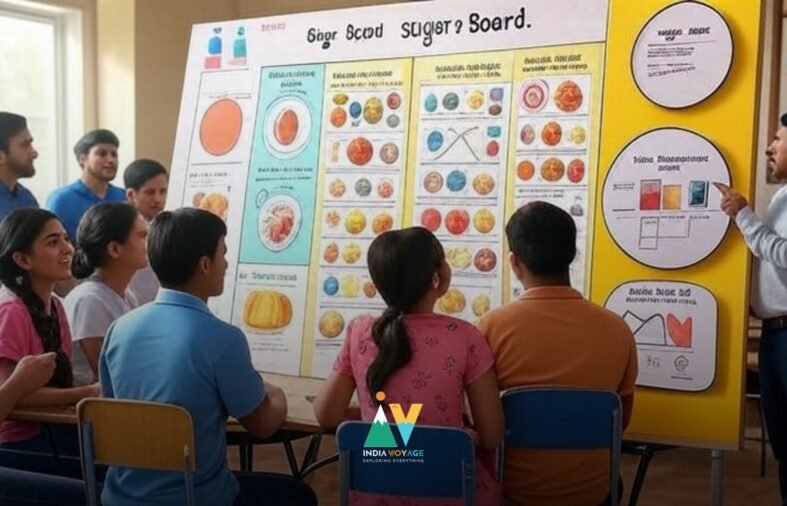The Central Board of Secondary Education (CBSE), overseeing more than 26,000 schools in India, has launched a pioneering initiative by requiring all affiliated institutions to install “Sugar Boards” by July 15, 2025. Prompted by the National Commission for Protection of Child Rights (NCPCR), this program seeks to educate students and their families about the risks of excessive sugar consumption, addressing the growing prevalence of lifestyle-related health issues like Type 2 diabetes and obesity among young Indians.
Why Sugar Boards Matter
Recent data reveals a troubling trend: Indian children are consuming sugar at rates well above the World Health Organization’s (WHO) guideline of limiting added sugars to 5% of daily calories. Children aged 4–10 get about 13% of their calories from sugar, while those aged 11–18 consume up to 15%. This overconsumption, fueled by easy access to sugary drinks, snacks, and processed foods, is driving a surge in health problems, including obesity, dental issues, and Type 2 diabetes—a condition increasingly seen in children, not just adults. The NCPCR emphasized that schools, as key influencers of young minds, must play a central role in tackling this crisis, leading to the introduction of Sugar Boards.
Understanding Sugar Boards
Sugar Boards are eye-catching, educational displays placed in schools to engage students with clear, relatable information about sugar intake. Using colorful visuals, simple facts, and practical examples, they cover:
- Daily Sugar Limits: Practical guidance on adhering to the WHO’s 5% calorie recommendation, often expressed in teaspoons for clarity.
- Sugar in Everyday Foods: Illustrations highlighting sugar content in common snacks, sodas, and packaged foods to reveal hidden sources.
- Health Consequences: Straightforward explanations of how excessive sugar can lead to serious conditions like diabetes, weight gain, and tooth decay, as well as affect focus and learning.
- Better Choices: Recommendations for healthier options, such as fresh fruits, unsweetened teas, or whole-grain snacks.
In addition to these displays, CBSE has urged schools to organize workshops, talks, and interactive activities to promote mindful eating. Some schools are weaving these lessons into their broader curriculum, aligning with the National Education Policy (NEP) 2020’s focus on holistic student development.
Transforming School Health Culture
The Sugar Boards initiative has garnered widespread support from educators, health professionals, and public figures. In his May 25, 2025, Mann Ki Baat address, Prime Minister Narendra Modi lauded the effort for encouraging students to make smarter food choices. Nutritionist Dr. Priya Sharma from Apollo Hospitals noted, “These boards are a game-changer, helping kids understand the impact of their dietary habits in a way that’s engaging and memorable.”
Schools are implementing the initiative with creativity. For example, Delhi’s Modern School has paired its Sugar Boards with a student-led “Healthy Bites” club, where students experiment with nutritious recipes. Meanwhile, Chennai’s Vidya Mandir School has revamped its canteen menu to prioritize low-sugar options. These efforts signal a shift toward embedding health consciousness in school environments.
Hurdles and Potential
Despite its promise, the Sugar Boards initiative faces challenges. Experts like Dr. Sanjay Verma, a pediatric nutritionist, argue that awareness alone isn’t enough. Comprehensive nutrition education, more physical activity programs, and restrictions on junk food marketing near schools are essential for lasting impact. The availability of sugary snacks outside school premises remains a concern, and ensuring uniform implementation across CBSE’s diverse network of schools—some with limited resources—will require careful oversight.
Engaging parents is also crucial. Schools are encouraged to involve families through community events and nutrition workshops to reinforce healthy habits at home. Some propose expanding the Sugar Boards model to workplaces and public spaces, creating a nationwide push for better nutrition.
A Healthier Tomorrow
The CBSE’s Sugar Boards initiative is a bold step toward addressing India’s youth health crisis. By equipping students with knowledge and encouraging better choices, it lays the groundwork for a generation that prioritizes well-being. As schools implement these boards and related programs, they’re doing more than raising awareness—they’re cultivating a culture of health and responsibility.
With sustained effort from schools, families, and policymakers, the Sugar Boards could inspire a broader movement to combat lifestyle diseases in India. For now, they serve as a vital reminder that informed choices today can lead to a healthier tomorrow.











Leave A Reply